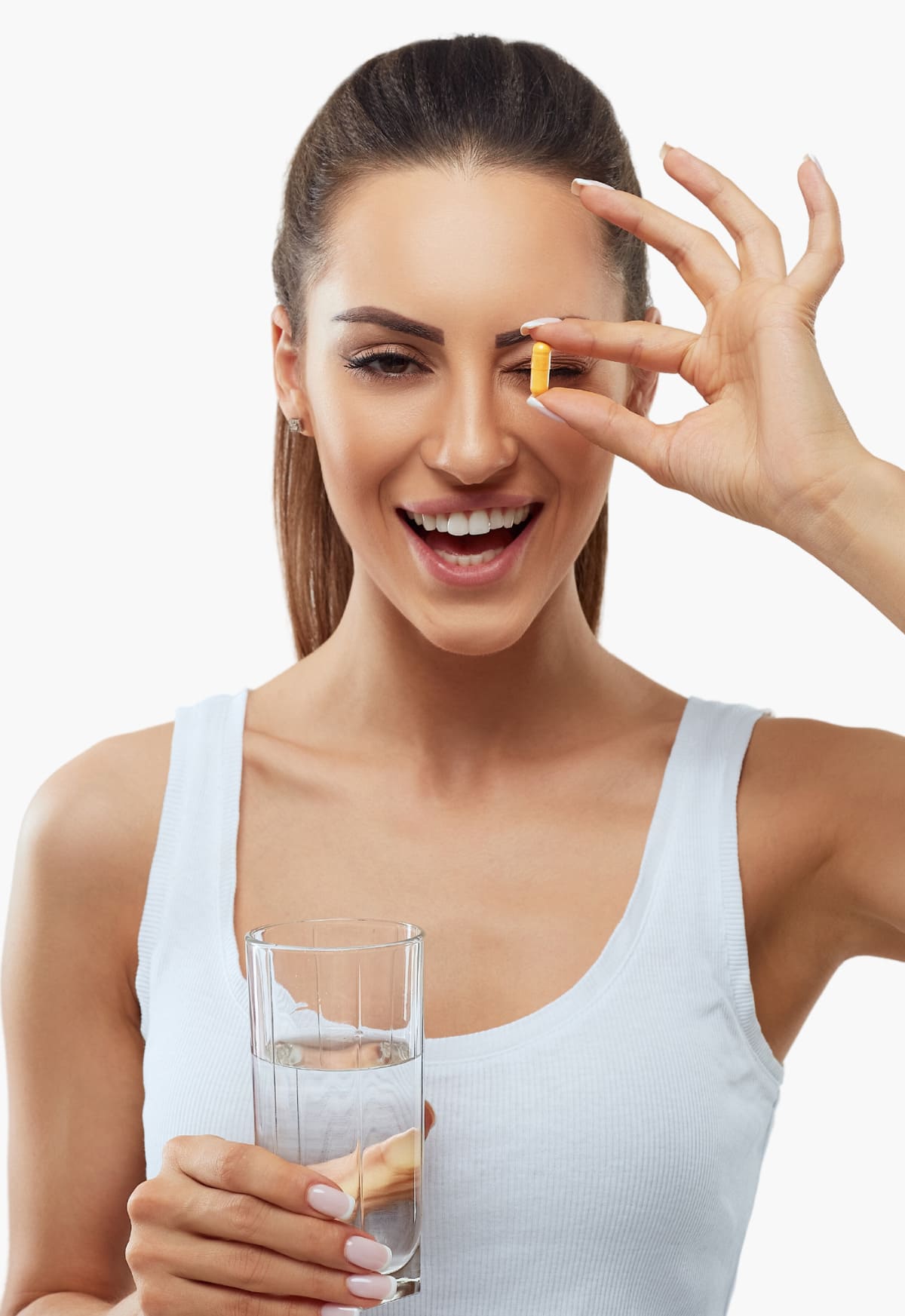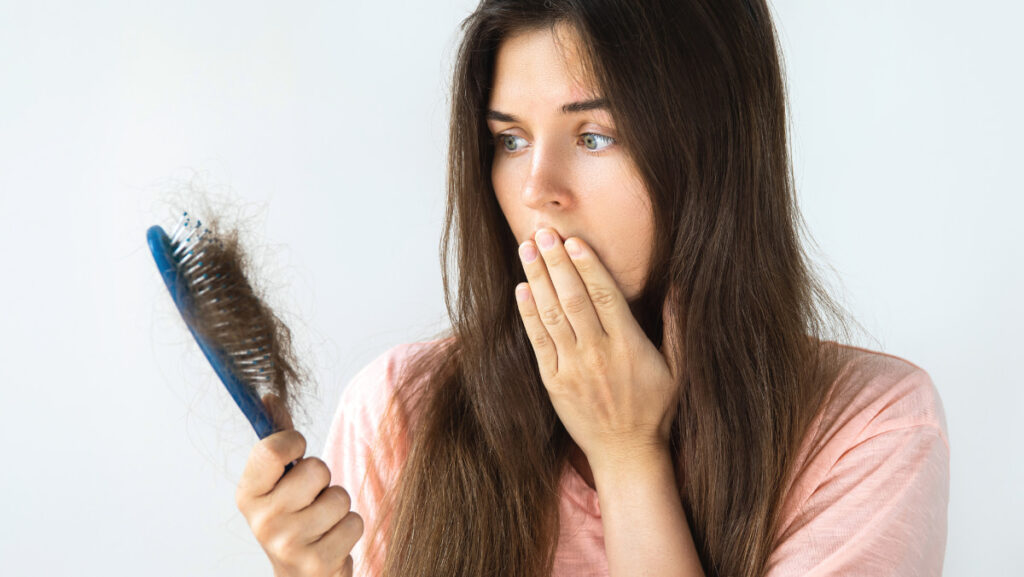
I totally get how you feel when you see more hair on your brush than you’d like—been there, done that, and it’s not fun. I’ve actually had my own battle with hair loss due to vitamin deficiencies, and let me tell you, it’s been quite an eye-opener.
So, I’ve been digging into the world of vitamins because, honestly, they can be total game-changers for our hair. I’ve learned so much about how the right ones can give our thinning hair a serious boost from the inside.
I’m excited to share with you the seven essential vitamins for thinning hair that have made a real difference for me. We’re talking about the good stuff here—biotin, Vitamin E, and Vitamin D—these are like superheroes for anyone dealing with fine or thinning hair.
This isn’t just some guide; it’s a collection of real info that’s helped me turn things around for my hair. And I’m pretty stoked to pass on these nuggets of wisdom to you. So, let’s jump in together and explore these vitamins. I’m here to walk you through it all like a friend who’s got your back.
Common Causes Of Hair Loss
There are different causes of hair loss (also known as alopecia), and it is important to find out which causes you to lose hair. So, first things first, we need to fully grasp the many different causes of hair loss before checking on hair vitamins for thin hair.
Hair loss can happen due to many variables, such as genetic factors or predisposition, vitamin and mineral deficiencies, skin problems, hair growth disorders, poor diet, hormonal problems, certain internal diseases, drug use, stress and depression, cosmetic factors, childbirth, and the chemotherapy process[1].
In my case, I considered these causes and could stripe off some things that weren’t related to me (for example, I’m young, I don’t do drugs, I haven’t had a child or chemotherapy). I normally have thick hair, so when I saw my hair thinning, I knew something was off, but not exactly what yet. I decided to ask my doctor to do a blood test (to see if we could find any deficiency. Bingo! My vitamin D and B12 were too low.
I recommend seeing a doctor and asking to get your bloodwork done, especially if you think it could be a vitamin or mineral deficiency. This will help evaluate what you need to get those healthy locks back.

10 Essential Vitamins For Thinning Hair
Among the about 100,000 hair follicles on the human scalp, 90% are in the anagen phase without alopecia. These follicles require critical nutrients, including proteins, vitamins, and minerals, to create healthy hair[2]. So, which vitamin deficiency causes hair loss?
Vitamin D
When your body lacks Vitamin D, your hair might become dry and brittle, prone to breakage. You might also notice more hair shedding than usual, and even premature graying could occur. Luckily, diagnosing this deficiency is as simple as a blood test.
Treatment typically involves daily Vitamin D supplements, but getting the right dosage from your healthcare provider is crucial to avoid any side effects. Other ways to boost your Vitamin D levels include soaking up some sun and adding foods like fatty fish and fortified dairy to your diet.
Vitamin A
If you’re running low on Vitamin A, your hair might start to thin out, and you might experience more shedding. Dandruff can also become a nuisance. A blood test can confirm if you’re lacking in this essential vitamin.
But there’s good news – you can reverse a Vitamin A deficiency. Supplements can help, but it’s essential to consult with a doctor, especially if you’re pregnant. Adding orange and yellow vegetables like carrots, sweet potatoes, squash, green peppers, and dark leafy greens, along with cod liver oil, to your diet can also make a difference.
Vitamin E
Low levels of Vitamin E might lead to increased hair shedding and thinning. Your hair could become dry and prone to breakage. A blood test can help confirm if you’re not getting enough of this vital nutrient.
Thankfully, Vitamin E deficiency is correctable. Supplements can boost your levels, and foods like sunflower seeds and almonds can provide natural sources. Applying oils like olive or rosehip oil can also help nourish your hair and scalp.
Vitamin C
Without enough Vitamin C, your hair might become dry and prone to splitting. Shedding could increase, and regrowth might take longer than usual. A blood test can determine if your levels are low.
To correct a deficiency, consider daily supplements and adding more Vitamin C-rich foods to your diet, like citrus fruits and broccoli. Topical applications of Vitamin C may also offer benefits.
Folic Acid (Vitamin B9)
Folic acid, or Vitamin B9, is crucial for healthy cell growth, including hair follicles. Low levels can result in increased hair loss and slow regrowth. Blood tests can detect this deficiency.
The good news is that you can fix a folic acid deficiency through diet and supplements. Tablets can help, and foods like leafy greens and citrus fruits are excellent sources.
Biotin (Vitamin B7)
Biotin, also known as Vitamin B7, is essential for healthy hair growth. It’s involved in the production of keratin, a protein that forms the structure of your hair. Low levels can lead to thinning and shedding. While its effectiveness in treating hair loss without a deficiency is debated, ensuring you get enough through sources like whole grains, eggs, and nuts is important.
Zinc
Zinc deficiency can impair various processes crucial for healthy hair, leading to thinning and increased shedding. Boost your intake through foods like oysters and spinach, and consider supplements under medical supervision.
Vitamin B6
Vitamin B6 plays a vital role in hair health, and a deficiency can lead to thinning or increased hair loss. Doctors can diagnose a vitamin B6 deficiency through blood tests. Boost your levels through foods like poultry and bananas, along with supplements if necessary.
Iron
Low iron levels can cause increased hair shedding and stunted growth. Doctors can diagnose iron deficiency through a blood test screening serum ferritin levels – readings below 30 ng/mL often indicate deficiency[3]. Boost your intake with iron supplements and iron-rich foods like red meat, beans, spinach, fortified grains, and lentils.
Omega-3
Essential fatty acids are essential for scalp health and can combat dryness and brittleness in hair. Ensure you get enough through supplements like fish oil capsules and foods like salmon and walnuts.
Do Hair Growth Vitamins Help To Prevent Hair Loss?
As we already talked about, when it comes to preventing hair loss, there’s no one-size-fits-all answer. That said, the role of vitamins and a well-balanced diet cannot be overstated.
Vitamins like B vitamins (including biotin or B7) and minerals play a crucial role in maintaining the overall health of your hair. They’re involved in producing red blood cells, which carry oxygen and nutrients to the scalp and hair follicles. This process is key for hair growth and strength and prevents hair from falling out.
Biotin supplementation has been widely discussed and recommended for those with thinning hair. It’s known for strengthening nails and hair, making it a popular ingredient in many hair growth supplements. However, it’s essential to approach supplementation under the guidance of healthcare professionals or a board-certified dermatologist to ensure you’re addressing your needs without going overboard.
A key to effective hair growth and prevention of hair loss lies in a holistic approach that includes nutrition, avoiding harsh hairstyles, and sometimes, the use of specialized shampoos containing ingredients like saw palmetto or ketoconazole, which have been linked to hair preservation[4][5].
Are Hair Growth Supplements Safe?
If you’re like me and many of my friends, you might be eyeing those hair growth supplements, wondering whether they’re the golden ticket to healthy hair. But here’s the million-dollar question: Are they safe?
First up, it’s critical to understand that hair growth supplements are regulated as foods by the U.S. Food and Drug Administration (FDA). This means manufacturers aren’t required to show proof of safety, quality, or efficacy before their products hit the shelves. Sounds a bit unsettling, right?
That’s why opting for third-party tested supplements can offer some peace of mind by ensuring the product contains what it says on the label without nasty surprises.
Another point worth noting is that taking certain vitamins in high doses may lead to symptoms of toxicity. It’s a classic case of too much of a good thing turning bad. Multivitamins and mineral supplements can be safe for healthy individuals as long as they stick within the recommended daily allowance (RDA).
Moreover, if you’re dealing with specific conditions like alopecia areata, working with healthcare professionals or a board-certified dermatologist is your best bet. They can offer tailored advice and may suggest treatments beyond nutrition and supplements.

Best 8 Vitamins For Thin Hair
Don’t worry; I’ve got some great info on the best vitamins to help with thinning hair – I actually tried them myself. Now, I first want to say that the best way to get your vitamins is through a well-balanced diet, but if you still need a bit of help (or you’re vegan, for example), here are some great options to check out:
Naked Nutrition Ella Multivitamin For Women
First up, we’ve got the Naked Nutrition Ella Multivitamin For Women. This gem is packed with essential nutrients to help not just your hair but also healthy hormonal and immune support.
The stars of the show here are Vitamin A, Vitamin C, Vitamin E, Selenium, Carotenoids, and Zinc. It also contains clinically supported Black Cohosh Extract with cellular energizers for optimal methylation with CoQ10 and includes an array of whole food prebiotic rainbow fruits and greens for optimal gut health.
Hum Nutrition Hair Strong Gummies
Next, let’s talk about Hum Nutrition Hair Strong Gummies. These little treats are a dream come true if you’re not a fan of swallowing pills. Packed with vegan hair-loving ingredients like vitamin E, biotin, vitamin B12, folic acid, and zinc, they’re designed to strengthen your hair and nails.
Plus, they’re vegan, gluten-free, and non-GMO, which is a huge plus if you’re mindful about animal products.
Vital Proteins Beauty Gummies
Vital Proteins Beauty Gummies are loaded with vitamin A, vitamin C, biotin, and zinc; made with a unique blend of beauty-centric nutrients to support healthy skin, hair and nails. Plus they have a strawberry flavor!
The Beauty Gummies are made without gluten, dairy, or soy and are free of synthetic colors and artificial flavors.
SugarBearHair Hair Vitamins
SugarBearHair Hair Vitamins are a cult favorite for a reason. These adorable blue bears are more than just Instagram-worthy; they’re formulated with Vitamin A, Biotin, Vitamin D, Vitamin E, Vitamin B6, Folic Acid, Vitamin B12, Iodine, Zinc, Choline, and Inositol.
This powerhouse combo supports healthy hair from the follicle out, aiding in the fight against hair thinning. Plus, they taste really good – a delicious treat for your hair and taste buds.
Naked Nutrition Ella Collagen Beauty Protein Powder
For those who love a good smoothie, Naked Nutrition Ella Collagen Beauty Protein Powder is your go-to. This protein powder does double duty with collagen and protein, supporting hair growth and strength. It even contains hyaluronic acid for well-hydrated, plump, and supple skin.
It combines collagen peptides, vitamin C, biotin, and zinc to promote natural keratin production, boost skin density and smoothness, and create healthy hair and nails for overall beauty. Mix the chocolate or vanilla powder into your morning smoothie for a tasty and nutritious hair boost. Plus, it doesn’t contain any sugar!
Lemme Chill Gummies
While these aren’t 100% focused on hair, we found out that stress might be affecting your hair. Lemme Chill Gummies are here to help, infused with ashwagandha, a powerful adaptogen that helps reduce stress levels, and a powerful blend of time-tested botanicals, including Passionflower, Lemon Balm, and Goji Berry.
Lower stress means happier hair follicles, which can lead to healthier hair growth. Plus they’re vegan, gluten-free, non-GMO, and gelatin-free. No high fructose corn syrup, artificial sweeteners or synthetic colors.
Lemme Matcha Gummies
Another Lemme product that I love and isn’t 100% a hair gummy either, it does have great ingredients! Got a thing for matcha? Then you’ll love Lemme Matcha Gummies.
They’re made with organic matcha made from finely ground green tea leaves and offer unique polyphenol, antioxidant, chlorophyll, and theanine properties, which can help protect your hair and scalp from damage, promoting healthy hair growth. It also contains Vitamin B12 to support cellular energy, energy metabolism, and nervous system health – this gummy boosts your energy and your hair!
Ouai Thick & Full Supplements
Last but definitely not least, Ouai Thick & Full Supplements are a powerhouse for anyone looking to boost their hair’s volume and density. With ingredients like biotin and magnesium salts of fatty acids, these supplements work to support the hair growth cycle, minimize shedding, and promote a thick, full head of hair.
Other Ways To Help Battle Thinning Hair
Conditions such as hypothyroidism and hormonal imbalances can often be fought by implementing lifestyle changes and ingesting a combination of nutrition and supplements.
If stress is playing havoc with your hairline, you’ve got options there, too. Try out stress-reduction techniques like yoga, meditation, or even deep breathing exercises. Here are some other remedies worth considering:
- Scalp massage: Just a few minutes each day could help stimulate blood flow to your scalp.
- Essential oils: Oils such as lavender and rosemary have been linked to promoting healthy hair growth.
- Medicinal plants: Some plants, like ginseng, have shown the potential to aid in hair health.
- Proper hair care: It might sound simple, but using gentle products and avoiding excessive heat can go a long way!
- Platelet-rich plasma (PRP): Though this requires professional guidance – it has shown promising results!
Final Thoughts On The Essential Vitamins For Thin Hair
Eating right and treating your hair well is key. Make sure you’re getting plenty of hair-loving vitamins like A, B, C, D, E, iron, and zinc in your meals.
But don’t just stop at diet—use the right products and be gentle with your hair. It’ll take some time, but stick with it, and you’ll see your hair start to fill out. Everyone’s hair is different, and if you’re really struggling, check in with a (hair) doctor. Alright, get that healthy, full hair you’re after!
Frequently Asked Questions
How we reviewed this article
- Process
